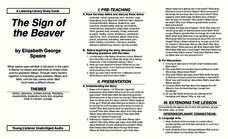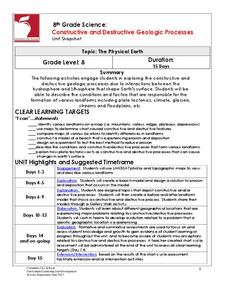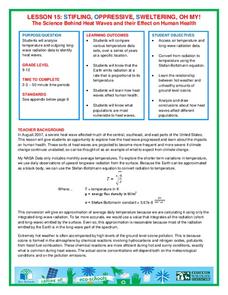The New York Times
Trouble in the Hive: Researching the Decimation of Honeybee Colonies
Teach your class about colony collapse disorder and foster discussion about causes and solutions for the honeybee problem. Class members read and discuss an article and participate in one of two detailed activities about pollination and...
PBS
Parachute Parade
Sail to the ground with a parachute activity! Kids construct parachutes out of household items and a toy figure, after brainstorming the best way to reduce drag. Once they test their parachutes, they can adjust their projects to optimize...
Miami-Dade County Public Schools
Veteran's Day—Honoring All That Served
Looking for ideas on ways to recognize Veteran's Day? Check out this 92-page packet that includes exercises designed for all grade levels. Reading passages detail the history of the holiday, research projects get individuals involved in...
Listening Library
The Sign of the Beaver
Extend a class reading of the novel The Sign of the Beaver across all subject areas with this literature unit guide. From basic discussion questions and writing prompts, to a research project about tracking animals, this resource offers...
Mary Pope Osborne, Classroom Adventures Program
Mummies in the Morning Egyptian pyramids, hieroglyphics
Visit the Magic Treehouse and take your class on a trip through time with a reading of the children's book Mummies in the Morning. Using the story to spark an investigation into Egyptian culture, this literature unit engages...
Constitutional Rights Foundation
History of Immigration Through the 1850s
Everyone living in the United States today is a descendant from an immigrant—even Native Americans. Learn about the tumultuous history of American immigration with a reading passage that discusses the ancient migration over the Bering...
Curated OER
Human Cloning: Is it Biological Plagiarism?
Is cloning good or harmful? Help your class understand the risks and benefits as they read, research, and discuss human cloning. Individuals form teams, research information, and present to the class before concluding with an in-depth...
National Energy Education Development Project
Great Energy Debate
If someone yelled for eight years and eight months, they could produce enough energy to heat one cup of coffee. A lesson on energy encourages scholars to research 10 different energy sources in groups before playing a game. Twenty...
Purdue University
The Represented World: Recreational STEM
How are forces and motion important to a swing set? Scholars explore the concepts of force and motion using swing sets. In preparation for their own STEM design project, individuals take surveys and data from peers, complete labs on...
Sea World
Arctic Animals
Discover the coldest animals in the world with a lesson about the Arctic habitat. Kids use a glossary and information sheet about animals found in the Arctic Circle to complete several activities, including tracking the lemming...
Teach Engineering
Earthquakes Living Lab: Designing for Disaster
Build and design to rock and roll. Pairs research building design in earthquake areas and use computer simulations to see the effects of earthquakes on buildings,. They then sketch and explain a building design that would withstand a...
NOAA
Off Base
How does carbon dioxide affect the world's oceans? The final installment in a series of six lessons has pupils research ocean acidification, then conduct an experiment to witness the delicate balance that exists in our seas. Materials...
Safe Drinking Water Foundation
To Filter or Not to Filter
Drinking clean water can be taken for granted. Explore the process and high cost of filtering water with a water pollution and filtration activity. Young scientist build a filtration system to filter polluted water, examine the economics...
NASA
Let's Investigate Mars
Take your science class on a hypothetical field trip to Mars with an engaging astronomy lesson. After first learning about NASA's Mars rover missions, young scientists plan their own scientific investigations of Earth's nearest neighbor.
Columbus City Schools
Constructive and Destructive Geologic Processes
Show the class the world as they've never seen it before—from way above! Learners try to unravel the mysteries presented by rich satellite imagery, learn to interpret topographic maps, and study erosion by constructing their very own...
America's Blood Centers
My Blood, Your Blood
Dracula isn't the only one who needs blood to survive. The eight-part unit includes seven lessons, five demonstrations, seven labs, and a project to organize a blood drive. Class members learn about the parts of blood, the form and...
Curated OER
Testing for Life’s Molecules
Want to hear a joke about sodium? Na. Young scientists test various materials to identify if they include protein, starch, and glucose by using the Biuret test, iodine starch test, and Benedict's test respectively. After practicing with...
National Wildlife Federation
Stifling, Oppressive, Sweltering, Oh My!
Looking for a hot date? Pick any day in August, statistically the hottest month in the United States. The 15th lesson in the series of 21 instructs pupils to investigate the August 2007 heat wave through NASA data, daily temperature...
PBS
NOVA Sun Lab Lesson Plan
Looking for a sun-sational multi-lesson plan full of videos, simulations, and discussion? Introduce your young scientists to all things solar with a four-part hands-on adventure. Pupils learn the basics of solar anatomy, space weather,...
Curated OER
habitat Powerpoint Project and Webquests
Using a provided PowerPoint template and a list of relevant web sites, 4th graders create an animal habitat presentation. This lesson includes relevant web sites, vocabulary, PowerPoint template, rubric and full lesson plan. This link is...
Teach Engineering
The Keepers of the Gate Challenge
Help your class make a connection between salt water and nanoscience. In the introductory lesson of a seven-part unit, the class explores why salt water helps a sore throat feel better. Pupils conduct preliminary research about the...
ARKive
Adaptations for Movement
What animals are best suited for moving around a rainforest, or a desert? Design your own animal species based on a particular habitat, focusing on the characteristics it will need for optimal movement. Great as a group lesson or...
Curated OER
Density Studies of the Earth
Density comes to life as investigators place soda cans into containers of various liquids to find if they sink or float. They layer different density liquids, compare densities of different gases, and more. A total of six different...
Curated OER
Neurons and the Nervous System
The highlight of this series is activitiy #4. Anatomy pupils examine slides of three unknown cells. With the function of the nervous system in mind, they consider the structure of each and try to guess which one is part of that system....

























